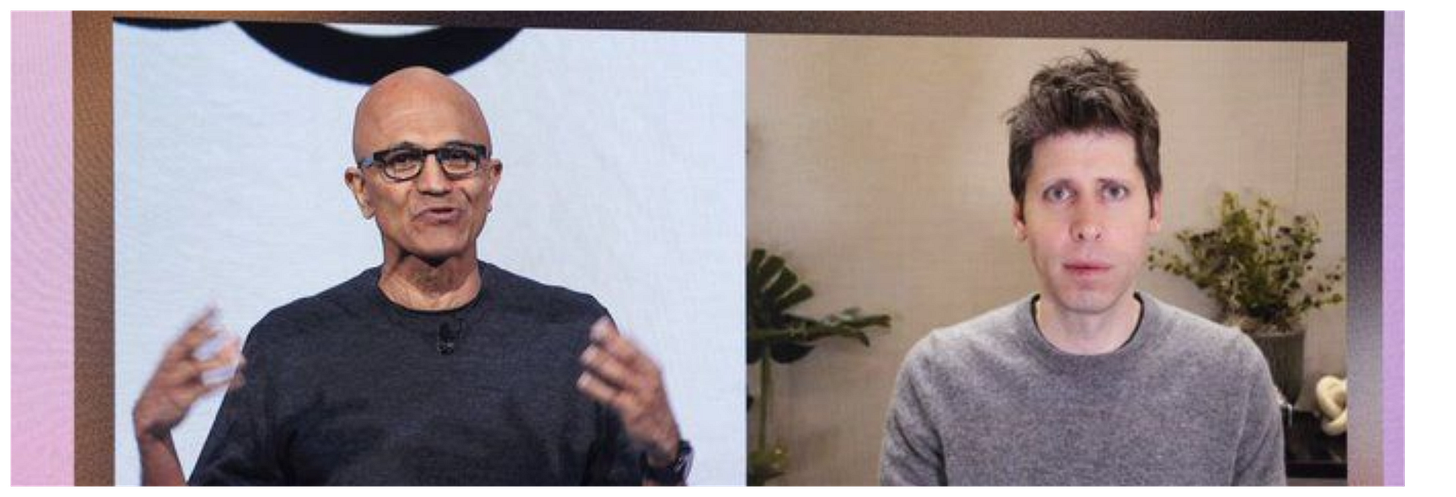Good morning. It’s Thursday, June 26. Today we are covering:
OpenAI, Microsoft Rift Hinges on How Smart AI Can Get
WhatsApp rolls out AI-generated summaries for private messages
Bipartisan 'Open App Markets Act' resurrected to challenge Apple's App Store control
Creative Commons debuts CC signals, a framework for an open AI ecosystem
Deep tech is driving the next frontier in in-flight connectivity
Let’s dive in
OpenAI, Microsoft Rift Hinges on How Smart AI Can Get
By Berber Jin via Wall Street Journal
A rift has emerged between OpenAI and Microsoft over the definition and timing of artificial general intelligence (AGI), which could let OpenAI limit Microsoft's access to its future AI technology.
Sam Altman believes AGI is near and wants OpenAI to declare it soon, while Satya Nadella remains skeptical, calling AGI declarations “nonsensical benchmark hacking”—a clash that mirrors broader Silicon Valley debates.
As OpenAI pushes to become a for-profit company, negotiations with Microsoft have intensified over equity, IP rights, and exclusivity terms—particularly whether Microsoft retains privileged access to OpenAI's tech after AGI is declared.
𝕏: This is a pretty incredible story, in part because it reveals that multiple Microsoft executives when they invested in OpenAI in 2023 believed that OpenAI's business would fail. Oh, and OpenAI is Microsoft's biggest Azure customer. - Ed Zitron (@edzitron)
WhatsApp rolls out AI-generated summaries for private messages
By Emma Roth via The Verge
WhatsApp now lets users generate AI-powered message summaries to catch up on unread private chats, using Meta AI to produce bulleted recaps instead of displaying full messages.
The feature is optional, available in English in the US, and relies on Meta’s Private Processing to ensure summaries remain private and hidden from Meta and other users.
This follows broader integration of Meta AI features into WhatsApp—including chat-based queries and image generation—though some users have criticized the rollout and lack of control over new interface elements.
𝕏: TL;DR as a major AI feature was not on my bingo card but seems to be working. Now in Gmail email threads too. - Tweets from Zach Weinberg (@zachweinberg)
The best way to reach new readers is through word of mouth. If you click THIS LINK in your inbox, it’ll create an easy-to-send pre-written email you can just fire off to some friends.
Bipartisan 'Open App Markets Act' resurrected to challenge Apple's App Store control
By Amber Neely via AppleInsider
U.S. lawmakers have reintroduced the bipartisan Open App Markets Act, targeting Apple and Google's control over mobile app distribution by promoting third-party app stores, sideloading, and alternative payment systems.
The revised bill includes new provisions to safeguard intellectual property, address national security, and limit retaliation against developers—especially around remote access and cloud gaming.
Despite these updates, the bill is expected to face intense Big Tech lobbying, echoing the 2021 version that was derailed after Apple, Google, Amazon, and Meta spent nearly $95 million opposing it.
𝕏: Big Tech giants have forced American consumers to use their app stores at the expense of innovative startups that threaten their bottom line. Today, @SenBlumenthal and I filed the Open App Markets Act to promote competition and protect consumers within the app market. - Sen. Marsha Blackburn (@MarshaBlackburn])
Creative Commons debuts CC signals, a framework for an open AI ecosystem
By Sarah Perez via TechCrunch
Creative Commons has launched CC signals, a new initiative aimed at helping dataset owners clearly communicate how their content can or cannot be used for AI training, addressing growing concerns over data use and openness online.
The framework offers a mix of legal and ethical tools, similar to CC licenses, to support transparent and enforceable data-sharing agreements between content providers and AI developers.
With rising tensions over AI data scraping—highlighted by policy shifts at X, Reddit, and Cloudflare—CC signals positions itself as a constructive alternative and will launch in alpha this November, with public input now being gathered.
Deep tech is driving the next frontier in in-flight connectivity
By Stewart Marsh via SpaceNews
Airbus and Amazon’s Kuiper are partnering to enhance in-flight connectivity (IFC) with low Earth orbit (LEO) satellite coverage, while Airbus also taps Hughes Network Systems and Telesat’s Lightspeed for added flexibility, signaling a trend toward hybrid, multi-network strategies.
Despite progress, true interoperability across satellite systems remains a challenge; advanced antenna tech, including millimeter wave FDD antennas, metamaterials, and beamforming-enabled ESAs, will be critical to achieving scalable, high-performance IFC.
Deep tech breakthroughs—like a zero-emission aircraft-mounted 5G antenna from Stratospheric Platforms Limited—highlight the potential for transformative aviation connectivity, with success hinging on bold investment, flexible architectures, and cross-industry collaboration.
We're thrilled to bring you ad-free news. To keep it that way, we need your support. Your pledge helps us stay independent and deliver high-quality insights while exploring new ideas. What would you love to see next? Share your thoughts and help shape the future of Newslit Daily. Thank you for being part of this journey!
Trending in AI
Anthropic now lets you make apps right from its Claude AI chatbot
AI is doing 30%-50% of the work at Salesforce, CEO Marc Benioff says
Thanks for reading to the bottom and soaking in our Newslit Daily fueled with highlights for your morning.
I hope you found it interesting and, needless to say, if you have any questions or feedback let me know by hitting reply.
Take care and see you tomorrow!
How was today’s email?



















Share this post